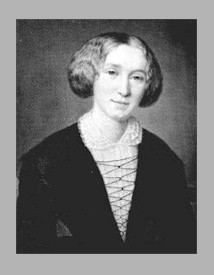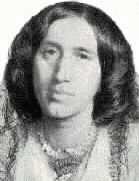![]()
![]()
![]()
The Writing of Marian Evans (George Eliot)
![]()
![]()
![]()
Under name George Eliot, Marian Evans (England 1819-80) wrote novels Adam Bede, The Mill on the Floss, Silas Marner, Romola, Felix Holt the Radical and Middlemarch, on net including as here to Princeton, and Daniel Deronda. Woman wronged is a common turn but heroines predominate. The settings are remote from contemporary urban life, which is part of the entertainment. The timeless human issues boldly acted out with commentary are of the largest kind - gender, justice, love, morality, peoples, politics, religion.
 | Romola (1862), Daniel Deronda (1876) and Middlemarch (1871) are massive works. Romola centres on the life of a young woman, Romola, in turbulent 15th century Florence. It is replete with renaissance concerns and historical figures Savonarola and Machiavelli. Daniel Deronda is set in Evans's time and includes attention to London Jewish circles and ideas, also the disastrous marriage of Gwendolen. Middlemarch, the greatest of the works, has the most developed and interacted characters. Especially through Dorothea, its preoccupation is with the pursuit of secular goodness and knowledge. The setting is then recently past English provincial life as with Adam Bede, The Mill on the Floss, Silas Marner and Felix Holt. Adam Bede (1859) is a tale of the young loves of carpenter Adam, butter-maker Hetty, squire Arthur and Methodist preacher Dinah. Mill on the Floss (1860), much autobiographical, is on the rebellious youth of Maggie. Silas Marner (1861) is in part a study of wrongful accusation. In Felix Holt (1866), the greatest power under heaven, according to Felix, is public opinion - the ruling belief in society about what is right and what is wrong, what is honourable and what is shameful. Yet he commits manslaughter at a political riot and Esther makes monumental decisions. |
Three short stories, Scenes of Clerical Life, preceded the novels. Others are The Lifted Veil and Brother Jacob.
A poetry volume was Spanish Gypsy, linked here to U. Michigan. Some has been set for song. Another was Jubal and other poems which included The Choir Invisible.
Especially in earlier years, Marian Evans was a translator, editor and essayist. She translated from German and had published Strauss's Life of Jesus (1998 edition note) and Feuerbach's The Essence of Christianity. These put a radical humanist Christianity and were influential, including to the young Karl Marx. A translation from Latin of Spinoza's Ethics was unpublished. A minor essay is Silly Novels by Lady Novelists. A collection of essays Impressions of Theophrastus Such was Evans's last completed work.
Some recommended George Eliot web links
George Eliot bibliographies include those of Victorian Web.
SOME BIOGRAPHIES
Frederick Karl George Eliot a Biography (1995); Rosemarie Bodenheimer The Real Life of Mary Ann Evans (1996); Rosemary Ashton George Eliot: A Life (1998); Kathryn Hughes George Eliot: The Last Victorian (1999).
| From Frederick Karl Her life and fiction, together, speak of the entire century. She assimilated thoroughly its humanistic and scientific ideas, she understood more than any other figure what was happening to ordinary people, and she found ways to express in her own person and her work the density, texture, and aspirations of the period. Perhaps only Dickens and Carlyle join her here, but their genius was eccentric, often wild and extreme, whereas hers was in the main balanced, stable, and cognizant of human limitations. Without losing sight of man's (and woman's) aberrations, she was, all in all, reasonable... What helps to make Eliot the voice of the century is that recognition, projected from herself, of the uncertainties, the destabilization, the wobbling center in Victorian life. Added to this was her realization of the ambiguous, even precarious, role of women. In those areas which later became the prerogative of feminists, she was caught between the daring of her private life and her difficulty in putting that daring into public policy, or public statements. But far more than even this, she was deeply divided as a person, full of contradictory impulses. Profoundly religious when growing up, she moved toward a rationalism and secularity that never completely replaced her earlier Calvinism. Her humanitarian impulses, her avowed humanism, her earnestness as to individual duty and discipline were all calculated responses to a religious or spiritual life she could no longer experience; and yet the substitutes proved unsatisfactory. She wanted a Christianity with her own kind of Christ; she wanted not a church but an individual who was his or her own church; she found in reason, logic, and intelligence a replacement for a God she could no longer believe in or accept. And yet none of this was easily resolved, as we will observe in her best fiction. Like most great artists, she left a good deal open to interpretation. |
CINEMA claiming basis in the writing of George Eliot
Adam Bede. 1991. British dir. Giles Foster. Iain Glen, Susannah Harker.
Middlemarch. 1994 British mini series dir. Anthony Page. Juliet Aubrey, Patrick Malahide.
Mill on the Floss. 1937 British dir. Tim Whelan. Frank Lawton, Victoria Hopper, James Mason. "Disappointing, dramatically uneven" - Maltin's Guide.
Mill on the Floss. 1997 US dir. Graham Theakston. Emily Watson, Ifan Meredith.
Silas Marner. 1985 British dir. Giles Foster. Ben Kingsley, Jenny Agutter. "Solid, marvellously detailed" - Maltin's Guide.
A Simple Twist of Fate. 1994 US dir. Gillies MacKinnon, from Silas Marner. Steve Martin (produced and wrote), Gabriel Byrne. "Interesting if never quite arresting" - Maltin's Guide.
See further and for silents 1909-1924, Internet Movie: George Eliot.
~~~~
| The image to right of Marian Evans is adapted from a colour drawing by Frederick Burton completed in 1865, for which she sat.
|  |
Names The Writing of Marian Evans (George Eliot) ©1999-2019 Don Just Melbourne Australia this is page www.justd.com/evans.htm | |